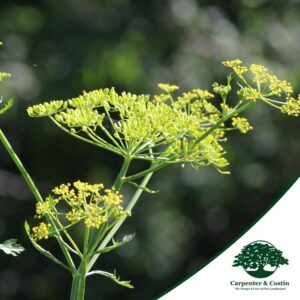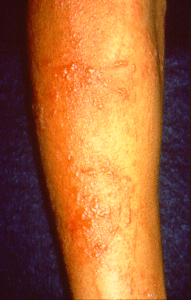 The Vermont Health Department advises people to stay away from direct contact with the invasive Wild Parsnip due to its highly poisonous sap.
The Vermont Health Department advises people to stay away from direct contact with the invasive Wild Parsnip due to its highly poisonous sap.
In Vermont we are increasingly seeing this invasive, yellow-flowered weed growing along roadsides, field edges, and meadows. Some folks find its flower and form attractive, often mistaking it for the very common and similar-looking (but harmless) white-flowered plant – Queen Anne’s Lace. Do not make this mistake as the Wild Parsnip causes severe skin damage!
Brushing up against this yellow flower will get the sap or oil of this plant on your skin. The trouble is, large and painful blisters will appear on the skin immediately when exposed to sunlight. In some cases, the painful burns are like second-degree sunburns that can cause excruciating rashes and raised blisters. Such exposure often happens when people weed whack the plants, walk or hike in close proximity to the plants, when mountain biking, or something as simple as retrieving a stray ball from the edges of a sports field.

Wild Parsnip is invading schools and sports fields.
Recently Carpenter & Costin has been contacted by several schools asking how to deal with the nasty weed that has been invading and rapidly advancing on their fields. Those conversations got us thinking; how many other schools are in need of assistance? Then our thoughts shifted to assisted living facilities. It is commonplace to see senior residents walking the grounds. How could we best protect them as they are out exploring nature after being shut in for so many months already? What about towns and recreation departments whose field edges, and even roads, are so often lined with wild parsnip? The danger to children playing intramural sports or family recreation is also very high should they venture off to get a stray ball.
Fortunately, treatment for this weed is very effective, but get at it early. Stay ahead of the curve because once the plant goes to seed, you have lost the battle for that year. You MUST get to the plant before the flowers mature and drop their seeds. If you happen to see this weed, stay away from it! If you see it on your property, a property you manage, or a field or meadow where recreation occurs, beware. Give us a call and we can lay out an effective plan to quickly eradicate it.
After all, with these challenging times, our time spent outdoors is even more precious than ever. We can help keep you and all our fellow Vermonters safe and free of this intrusive villain. All we need is some swift action. Call 802-775-5686 to solve this on your property.